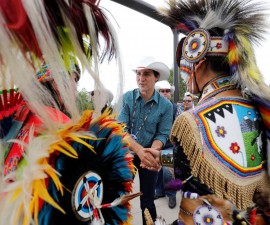(单词翻译:单击)
HARI SREENIVASAN, PBS NEWSHOUR WEEKEND ANCHOR: Last month at the United Nations General Assembly, Canadian Prime Minister Justin Trudeau promised to do more to help his country's 1.4 million indigenous people. He said there needed to be an effort to, quote, correct past injustices and bring about a better quality of life.
On Friday, the Canadian government took a step to repair that relationship. It agreed to pay $600 million in legal settlements for a program that for years forcibly separated indigenous children from their families and put them up for adoption around the country and around the world.
Ian Austen has been covering the story for "The New York Times" and joins me now via Skype from Ottawa.
Ian, let's first talk about how long running was this program? How many people would it affect?
IAN AUSTEN, REPORTER, THE NEW YORK TIMES: We're not sure precisely how many it affected but the best guess is about 35,000 people and it started in 1965 in various parts of the country, petered out about 19, 20 years later.
SREENIVASAN: How did the social workers determined whether a child needed to be taken out of their village, the reservation, their family?
Well, there were two huge problems from the outset. As the federal government was planning this program, it was very much aware that there would be a danger of eroding indigenous culture. So, it told the provinces that they should go and talk to leaders in indigenous communities about how social services should be provided to children. For whatever reason, that was never done.

And what happened was, social workers were set up to these remote, often remote communities. And they had no training about indigenous culture at all, and the biggest thing they didn't know about is indigenous culture has a heritage of communal child rearing. I was told many years, the first time I went to a reserve, you never asked a kid who their parents are. You say, where are you staying? Because they — at that point, they might be staying with an aunts, they might be staying with a grandparent.
So, these social workers came up — had no idea of any of this, looked around are around, it was the antithesis of southern Canada, and for them the solution was to just take these kids away and have them adopted on — the thinking being that they would be better off anywhere else than they were in their homes.
SREENIVASAN: So, what happened? They're adults now. I mean, did they sort of assimilate as the goal was or did they find themselves in a kind of weird no man's land where they didn't fit in southern Canada, but then now they didn't fit back into the tribe?
AUSTEN: This program took away — took them right out of the reserves, took away their birth names. They would get new names when they were adopted, often new given names.
And the court case that spurned this settlement found that there was a terrible legacy of emotional, mental and social problems affecting these people, because they — as kids, they were bullied by white kids at school. So, they never felt, even if they were with a loving family, they never really felt part of white southern culture, but they really couldn't go back home because they didn't know the language, you know, they had been completely pulled from that culture as well.
So, there are this — there was this whole generation of people who grew up in kind of social, cultural, emotional limbo.
SREENIVASAN: Ian Austen of "The New York Times", joining us via Skype today from Ottawa, thanks so much.
AUSTEN: Thank you very much.


